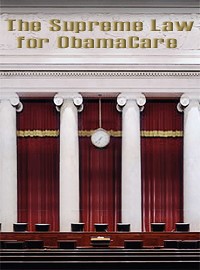| The Critical ObamaCare Law the Supreme Court Won’t Decide This Term |
 |
|
By Ashton Ellis
Thursday, March 01 2012 |
From March 26 to 28 the United States Supreme Court will hear an historic 5 ½ hours of oral argument about the constitutionality of various provisions in the Patient Protection and Affordable Care Act (i.e., ObamaCare). But while the questions presented to the Justices could, if answered correctly, result in eliminating much of the law’s most dangerous assaults on liberty, there is a very good chance that one particularly onerous provision will totally escape notice. As currently slated, the Supreme Court is scheduled to hear arguments on four key questions raised by ObamaCare.
The questions under review reflect the line of argument chosen by the state of Florida and the National Federation of Independent Businesses, as well as the Obama Administration’s defenses. But because the case before the Supreme Court is spearheaded by states and a trade association, the focus of their litigation centers on issues like federalism and the economic rights of employers. Of course, those issues affect all Americans, and should be contested vigorously. When the federal government seeks to make states and members of the private sector vassals of Washington, D.C., leviathan needs to be beaten back into his cage. Yet the point remains that missing from the discussion in March will be any mention of the constitutionality of the Independent Patient Advisory Board. IPAB is the council of so-called healthcare experts tasked with making good on ObamaCare’s promise to expand insurance coverage while controlling costs with rationed care and price ceilings. To do this, ObamaCare makes IPAB the only federal agency endowed not only with lawmaking power, but also with the ability to operate completely outside of congressional, presidential and judicial oversight. Why was IPAB left off the Supreme Court’s argument list? “Because there was so much focus on the individual mandate, the IPAB issue flew under the radar,” Daniel Himebaugh, a staff attorney with the Pacific Legal Foundation, tells CFIF. “That’s why the Coons case pending in Arizona is so important.” In Coons v. Geithner, the Goldwater Institute and PLF have made opposition to IPAB a central theme in the case against ObamaCare. In an amicus brief, PLF’s Timothy Sandefur traces how IPAB creates a government-within-a-government, whereby IPAB’s members can make spending decisions that are unalterable by Congress or the president, and unreviewable by the courts. What’s more, IPAB is the only federal body whose existence is perpetual unless Congress repeals its enabling legislation by August 15, 2017. By ObamaCare’s explicit terms, IPAB will be forever free of legislative, executive or judicial oversight because the text of the law prohibits any future Congress from repealing IPAB if it is left standing after the 2017 deadline. The Supreme Court could strike down IPAB, but only indirectly. According to PLF’s Himebaugh, “If the Supreme Court holds that all of ObamaCare’s provisions must fall as a result of the unconstitutional individual mandate, then that would include IPAB. But, if the mandate is severed from the rest of the Act, the IPAB issue is still on the table.” A growing number of Members of Congress are calling for repeal of IPAB. The most recent push came with a bipartisan vote to kill IPAB in the House Energy and Commerce Committee’s subcommittee on Health. The repeal bill will go to the full committee and then the House chamber where passage seems likely. But expectations are much dimmer in the Senate where liberal supporters of ObamaCare are reluctant to weaken President Barack Obama’s signature legislative victory during his campaign for reelection. Currently, PLF and the Goldwater Institute are in limbo with the Coons case because most lower federal courts presiding over challenges to ObamaCare are waiting to see what the Supreme Court says. In the event the Court chooses to strike down important elements of ObamaCare but allow the rest of the law to survive, expect to see IPAB land on its docket as quickly as the individual mandate did. “The challenge to IPAB is about the fundamentals of constitutional law,” says Himebaugh. “The case may well determine whether our courts will tolerate rogue agencies, like IPAB, or whether principles of limited and accountable government will prevail.” |
Related Articles : |
























